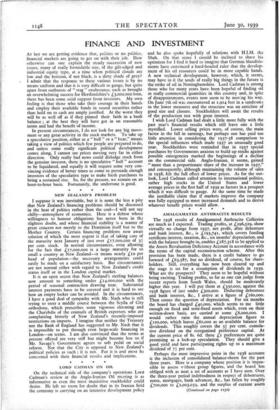LORD CADMAN ON OIL
On the technical side of the company's operations Lora Cadman's review at the Anglo-Iranian Oil meeting is as informative as even the most inquisitive stockholder could desire. He left no room for doubt that in its Iranian field the company is carrying on an intensive development policy and he also spoke hopefully of relations with H.I.M. the Shah. On that score I should be inclined to shale his optimism for I find it hard to imagine that German blandish- ments have convinced a hard-headed ruler that the develop- ment of his oil resources could be in more capable hands. A new technical development, however, which, it seems, may have in it the seeds of really big things in the future is the strike of oil in Nottinghamshire. Lord Cadman is among those who for many years have been hopeful of finding oil in really commercial quantities in this country and, in spite of disappointments, events now seem to be moving his way. On June 7th oil was encountered at 1,914 feet in a sandstone in the lower measures and the structure was an anticline of good size and closure. Stockholders will await the results of the production test with great interest.
I wish Lord Cadman had dealt a little more fully with the past year's financial results which still leave one a little mystified. Lower selling prices were, of course, the main factor in the fall in earnings, but perhaps one has paid too little attention in considering the 1937-38 comparison to the special influences which made 1937 an unusually good year. Stockholders were reminded that in 1937 special purchases by Governments anxious to build up stocks against possible emergencies marked the beginnings of a decline on the commercial side. Anglo-Iranian, it seems, gained " more than a proportionate share of the increase in 1937," and consequently, although maintaining the volume of sales in 1938, felt the full effect of lower prices. As for the out- look, Lord Cadman called attention to international politics, rather high stocks in the United States and lower average prices in the first half of 1939 as factors in a prospect which it was difficult to gauge. At the same time he made the justifiable claim that if markets improve the company was fully equipped to meet increased demands and to derive whatever benefit prices would allow.










































 Previous page
Previous page